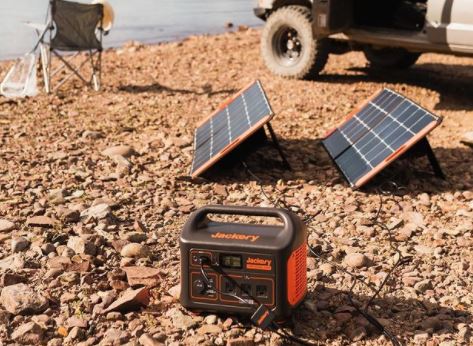Solar generators are a terrific way to have additional energy on hand, whether you need to keep your lights on when the power goes out or you want to charge your phone while camping.
But, in comparison to traditional gas-powered generators, how do portable solar power generators fare? We look at how solar generators function, consider the benefits and drawbacks, and explore whether or not a solar generator is a good investment for you.
What is a solar generator, and how does it work?
A solar power generator is, technically, any system that runs on solar energy. However, most people think of a solar generator as a portable power station that generates electricity using solar panels rather than fossil fuels.
A portable solar generator captures the sun’s energy with solar panels and then stores it in a battery for later use. A portable solar generator is commonly used for RV camping, boating, and as a backup power source in the event of a power loss from the grid.
Solar generators are made up of four main parts:
- Solar panels that can be carried around
- A charge controller for solar panels
- A solar battery or multiple solar batteries
- An inverter is a device that converts one voltage into another
The charge controller converts sunlight into direct current (DC) electricity, which is subsequently passed through the solar panels. The charge controller controls the voltage of the electricity going into the battery, which stores the solar energy for later use. Lithium ion batteries are used in the majority of solar generators nowadays.
The inverter turns the electricity stored in the battery into alternating current energy, or AC power, which is what most appliances and electronics utilize.
USB ports, AC outlets, and 12 volt carports are common features on solar generators, allowing you to charge numerous gadgets.
Solar generators’ benefits and drawbacks
Traditional gas-powered generators necessitate regular fuel purchases. There are no fuel costs with a solar generator. Simply install your solar panel and take advantage of the free sunlight!
Renewable energy that is clean
Solar generators are totally powered by clean, renewable energy sources. This means you won’t have to worry about not only the cost of fossil fuels to power your generator, but also the environmental impact of using gasoline.
When solar generators produce and store energy, they do so without emitting any pollutants. You can relax and enjoy your camping or boating excursion knowing that it is powered by renewable energy.
Low-maintenance and quiet
Another advantage of solar generators is that they are quite quiet. Solar generators, unlike gas generators, have no moving parts. This minimizes the amount of noise they make while running greatly.
Furthermore, because there are no moving parts, the risks of solar generator parts breaking are minimal. When compared to a gas generator, this significantly minimizes the amount of maintenance necessary for a solar generator.
Solar generators have a number of drawbacks.
High start-up costs
Solar generators are substantially more expensive to purchase than regular gas generators. A gas generator costs roughly $1,000 on average. Solar generators are usually around $2,000 in price.
Solar generators, on the other hand, have substantially reduced operating expenses. As a result, you’ll save money over the life of a solar power generator.
Recharging slowly
The batteries in solar generators can only be recharged while the sun is shining. Even then, charging the battery from the solar panels takes time. Most mid-sized solar generator batteries would take over 9 hours to charge using a solar panel with a power output of 100 watts.
Generators that run on fossil fuels may be refueled at any moment, allowing you to acquire extra power whenever you need it, regardless of the weather or time of day.
Power supply is limited
The size of the solar power generator battery will also limit the amount of power the generator can produce. A solar generator is unlikely to be sufficient to power your complete home. It can, however, charge phones and computers, as well as keep tiny appliances operating for a short time.
Because gas generators may be recharged at any moment, they have less limitations in terms of what they can power and for how long.
What are the most effective solar generators?
The battery capacity (or how much energy the battery can hold) is one of the most crucial factors to look for when buying a solar generator to determine if it will meet your power needs. This is often expressed as watt-hours (Wh).
The larger the battery’s capacity, the longer it will last. A 1,000 Wh solar generator, for example, can run a 60 watt lightbulb for nearly 17 hours!
Because most solar-powered generators are all-in-one, the solar charger and inverter are built into the battery pack. Solar panels are not included in all solar generators. The battery and inverter are usually included with these generators.
What are the most effective applications for solar generators?
Solar generators are best utilized to power small appliances and charge devices. Because of their portability, they’re an excellent backup power source for a boating or RV camping trip. They’re also clean and don’t use a lot of fuel.
In the event of an emergency, solar generators can power several important items in your home. However, no portable generator will be able to completely power your home off the grid.
Installing a rooftop solar panel system with battery storage is a better option. Not only will this provide backup power for the majority of your home in the event of an emergency, but it will also help you save money on your electricity bill all year!
The most important takeaways
Sun generators are portable power stations that generate electricity using solar energy rather than fossil fuels.
Solar generators are made up of four basic components: solar panels, solar batteries, inverters, and charge controllers.
Solar generators have several advantages, including the fact that they do not require fuel, that they run on clean renewable energy, and that they require very little maintenance.
Solar generators have a number of disadvantages, including a high initial cost, a delayed recharge time, and a finite amount of power stored and available for use.
image credit: Jackery

